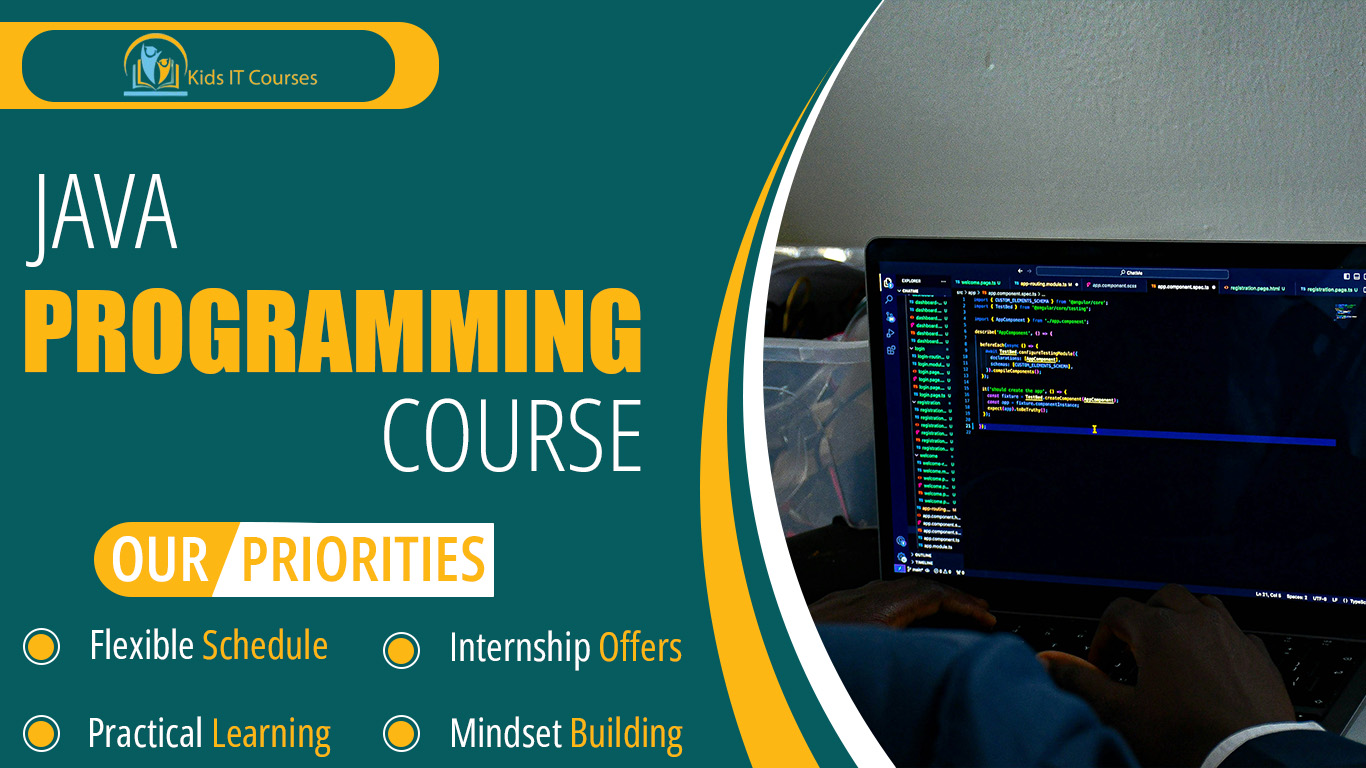
Java Programming Course for Kids
- This dynamic course introduces kids to Java programming — one of the most popular languages used for creating apps, games, and websites.
- Java is widely used in the development of Android apps, software applications, and large-scale systems. Through hands-on coding, fun projects, and interactive lessons, kids will learn to code in Java and develop real-world tech skills.
Java Programming | Kids Coding Classes nearby Rawalpindi
Definition
Kids learn to write code using Java, a strong and popular language. It’s used in apps, games, and even school software.
Java helps kids understand how programming really works. It’s great for building a deep knowledge of coding.
Kids can make simple games, apps, or calculators. It makes learning Java fun and exciting!
Java teaches them to write step-by-step instructions. It helps improve problem-solving and sharp thinking.
Kids use tools that professional developers use. It gives them hands-on experience with real tech skills.
Completing Java projects makes kids feel smart and proud. They enjoy seeing their code come to life.
Java is used in companies around the world. Learning it early gives kids a big head start in programming.
Importance
Java is used to build apps, games, and websites. Kids learn a real-world language used by professionals.
Many popular games and mobile apps are made with Java. Kids can start creating simple games and tools on their own.
Java helps kids think step-by-step to solve coding problems. It trains their brain to think clearly and logically.
Writing Java code takes focus and careful planning. Kids become more patient and thoughtful as they code.
Kids use tools like Eclipse or BlueJ to write and run code. It gives them hands-on experience with real developer software.
Creating a working app or program makes kids feel proud. They get excited to learn and build more things.
Java is used in jobs related to software, web, and app development. Learning it young gives kids a strong start in the tech world.
Advantages for Freelancing Purpose
Java is used to build apps, websites, and games. Kids learn a real language that’s used by pros.
Java helps kids break problems into steps and find smart solutions. It sharpens their brain and builds focus.
Kids can create simple games and apps with Java. It makes learning fun and hands-on.
Java teaches kids to write clean, reusable code. They learn how to build big projects one step at a time.
Fixing errors and making programs work gives kids a confidence boost. They feel proud when their code runs successfully.
Java powers websites, Android apps, and banking systems. Learning it early gives kids real-world skills.
Java is used by developers all around the world. This course gives kids a strong foundation for future tech jobs.
Session 1 : What is Java?
- What is programming?
- What is Java used for? (games, apps, websites, robots)
- Why Java is still popular
- Setting up a kid-friendly IDE (BlueJ, Replit, or IntelliJ with guidance)
Session 2 : Writing Your First Program
- Introduction to public static void main
- Your first Java program: “Hello, World!”
- How Java runs code (explained simply)
- Understanding curly braces {} and semicolons ;
Session 3 : Variables and Data Types
- What are variables in Java?
- Using int, String, double, boolean
- Storing and displaying values with System.out.println()
- Fun practice: make a mini profile program
Session 4 : User Input & Simple Output
- Using Scanner to take input
- Creating interactive Java programs
- Building a small quiz or fill-in-the-blanks story
Session 5 : Conditional Logic – If/Else
- Writing programs that make decisions
- Relatable examples: scoring, game choices, or unlocking levels
- if, else if, and else explained with visuals
Session 6 : Loops and Repetition
- Repeating actions with for and while loops
- Simple countdowns, multipliers, and pattern generators
- Mini challenge: Guess the number game
Session 7 : Functions and Reusability
- Why we break code into methods
- Writing simple methods with and without parameters
- Calling methods inside main()
- Mini calculator using functions
Session 8 : Arrays and Final Project
- Introduction to arrays for storing multiple items
- Looping through arrays
- Final mini project ideas:
- Student marks analyzer
- Name sorter
- Simple text-based game (like a treasure hunt)
Bonus Materials:
- Java syntax cheat sheet
- Debugging tips for kids
- Printable flashcards (for keywords and logic flow)
- Certificate of Completion
